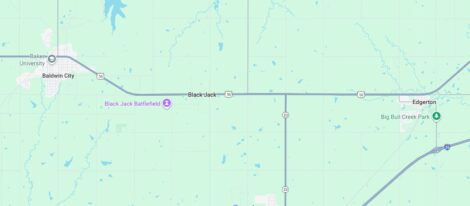Kansas bill is expected to cut opportunities for affordable housing projects across the state, if signed into law
Several other bills impacting local governments set to become law

photo by: Bremen Keasey/Journal-World
The Lawrence-Douglas County Housing Authority, located at 1600 Haskell Ave.
A bill awaiting the governor’s signature could phase out a key affordable housing tax credit in Kansas, raising concerns that it will make it harder to build and access housing for low-income families.
The bill – House Bill 2289 – will change how Kansas supports affordable housing through tax credits. These housing tax credits help developers build or renovate homes for low-income families by giving the housing developers tax credits. The developers, in turn, often sell those credits to other businesses that use them to reduce their tax bills, thus providing the housing developers a new source of revenue to build their projects.
The bill will gradually end one of these programs — the Kansas Affordable Housing Tax Credit. Starting in 2026, the state will limit how much credit is available each year, and the program will fully end after 2028. Projects using a 4% federal low income housing tax credit will stop getting support after 2025, while projects using a 9% tax credit will only have up to $8.8 million worth of tax credits available to them in any given year. That is a reduction from past years. For example, the program awarded more than $10 million in credits in 2025.
The Kansas Housing Resources Corporation administers various housing programs and makes the allocations for the low income housing tax credits. In Lawrence, there are apartment buildings that were awarded 4% tax credits in 2025 – 3100 Michigan Apartments in southern Lawrence and the Floret Hill housing development at Bob Billings and the South Lawrence Trafficway. For 2025, the total cap is $25 million, and credits that have already been awarded will still be honored. The 9% tax credit program also awarded tax credits to two Douglas County projects — a low income housing project for seniors at 5275 W. Sixth St. and a rent-controlled apartment complex to be built in Eudora.
Going further back, the tax credit programs have helped fund many Lawrence projects, including the Poehler Lofts in the Warehouse Arts district and the senior living apartments that currently are under construction near 11th and New Hampshire streets.
“The rent is based on the tenant’s income and you cannot charge market rate,” Shannon Oury, executive director of Lawrence-Douglas County Housing Authority, said of the key requirement of the program. “So the tax credit basically helps provide the margin for the developer and the owner to make it affordable … because the amount of rent won’t pay off what it costs to build the property.”
“The Housing Authority has not yet done a tax credit project … but it certainly is something that we are contemplating because it’s really the only way to build new affordable housing units,” Oury said.
However, Oury said the bill impacts the authority’s work because her organization has administered over 800 Section 8 Housing Choice Vouchers in the county, which provide rent assistance paid by the housing authority on behalf of an eligible tenant to a private landlord. She said many voucher holders are struggling to find available housing. Tax credit housing projects typically accept these vouchers, making them an important option for families in need.
“A good example is Union on the Loop,” Oury said. “They have a substantial number of voucher recipients in them … The bottom line is (that) tax credit projects really help to be able to utilize vouchers in our area.”
Oury said the cost of everything has gone up along with the costs for building these developments. In order to get new units on the ground, she said there needs to be a program for a developer that makes it so they can rent a unit at an affordable rate, and if we can’t, the price is the homeless population increases.
She added that in the past, the federal government has paid the vast majority of the cost for affordable housing across the country, but Oury doesn’t know if that will continue.
“And if it doesn’t continue, we’re going to have to look for local solutions,” Oury said. “Because at the end of the day, people have to have housing and shelter.”
The bill is currently awaiting action from Gov. Laura Kelly, who officially received the bill on Friday. The bill passed both the Kansas House and Senate by wide margins — 98-23 in the House and 33-7 in the Senate.
Several other measures have recently made their way through the Kansas Legislature that have the potential to impact local governments, including:
* Changes to election laws on voter registration, poll workers, and advance ballot applications. It requires removal of a voter’s registration when their obituary is posted online by a funeral home. It also allows active military and their families to serve as poll workers regardless of residency or voter status and sets U.S. citizenship and Kansas residency as requirements for election board judges and clerks.
Additionally, the bill modifies rules on the solicitation of advance voting ballot applications, including changes to disclosure requirements and the format for mailing these applications. The bill is intended to streamline election processes, improve voter registration maintenance, and ensure poll worker eligibility. The legislation was signed into law on April 7.
* The Kansas Municipal Whistleblower Act, which protects local government employees from disciplinary action for reporting misconduct, legal violations, or public safety concerns, even without notifying their supervisors first. It allows affected employees to take legal action against their employers, and requires the employer to post a copy of the Act in a place where all employees can see. The legislation was signed into law on April 7.
* The Fast-Track Permits Act, streamlining the permit process for local building developments in Kansas in order to promote economic growth and reduce regulatory delays from local governments.
It requires local governments to approve or deny building permit applications within 60 days of receiving a complete application and notify applicants within 15 days if their submission is incomplete. If no action is taken within 60 days, the application is automatically approved. The Secretary of Health and Environment is also required to decide within 45 days on applications to discharge stormwater from construction sites under federal permits or waivers. This legislation was signed into law on April 7.
* Require local governments to report economic development incentive program data to the Secretary of Commerce. It updates existing law by expanding reporting to include cities, counties, and recipients of incentives over $50,000 for programs starting after July 1, 2025, with data due within 30 days and annual updates required. This legislation was signed into law on April 1.
* Allow taxpayers that file taxes as the head of household to claim an extra $2,320 exemption for tax year 2024 and future years. The Department of Revenue expects no impact on State General Fund revenues, as the fiscal effect is already accounted for in the November 2024 revenue estimate. The bill has passed in the House and Senate, and is awaiting action by Gov. Kelly.
* The Constitutional Right to Health Freedom Act, which would limit the authority of the Secretary of Health and Environment in Kansas by removing the ability to designate infectious or contagious diseases and issue related orders. Instead, the Secretary would only be allowed to make recommendations regarding disease prevention, isolation, and quarantine.
The bill also removes reporting requirements for licensed professionals on certain infectious diseases, and eliminates local health officers’ power to prohibit public gatherings. The House and Senate overrode Gov. Kelly’s veto to the bill.







